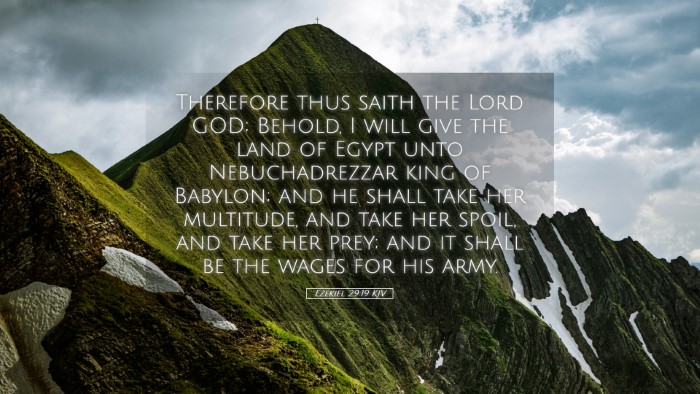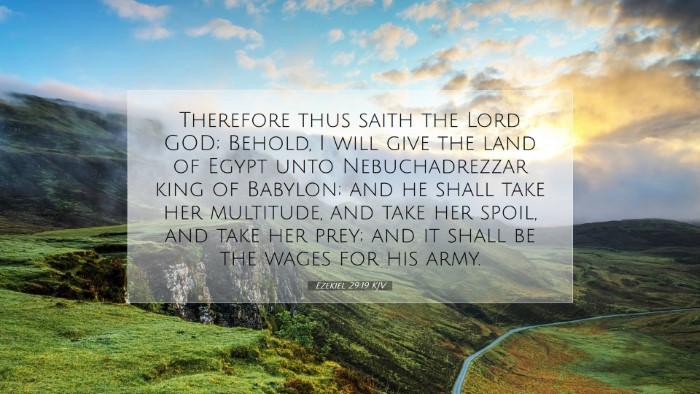Ezekiel 29:19 - A Commentary
Verse: "Therefore thus saith the Lord GOD; Behold, I will give the land of Egypt unto Nebuchadrezzar king of Babylon; and he shall take her multitude, and take her spoil, and take her prey; and it shall be the wages for his army."
Introduction
The passage from Ezekiel 29:19 presents a prophetic declaration regarding the fate of Egypt under the Babylonian ruler Nebuchadnezzar. This verse is pivotal in understanding the geopolitical upheavals of the ancient Near East, the divine judgment on nations, and the fulfillment of prophetic revelation. Through the eloquent insights of notable commentators, we will dissect this verse to uncover its theological depth and historical implications.
Theological Insights
The Divine Sovereignty Over Nations: This verse underscores the sovereignty of God over international affairs. As Matthew Henry notes, "God is able to give kingdoms to whom He will." In proclaiming that He will give Egypt to Nebuchadnezzar, the text asserts God’s divine right to govern the destinies of nations as a demonstration of His ultimate authority.
The Instrument of Judgment: Nebuchadnezzar is identified as God's instrument of judgment against Egypt. Albert Barnes emphasizes this role, explaining that Nebuchadnezzar's conquest is both a fulfillment of prophecy and a tool of divine justice. God uses mighty rulers as His agents to accomplish His purposes, which often include chastisement for idolatry and rebellion against Him.
Historical Context
The historical backdrop is crucial to understanding this prophecy. Adam Clarke elaborates on the circumstances surrounding Jerusalem's fall and the political landscape of the time. Egypt had historically been a strong power; however, it was prophesied to fall victim to Babylonian conquest. This event would not only alter regional power dynamics but also affect the Jewish exiles who looked to Egypt for support.
Egypt’s Decline:
The promise of Egypt's surrender to Nebuchadnezzar reflects a significant decline in Egyptian power after centuries of influence. The commentary from Matthew Henry highlights how God humbles nations that exalt themselves, serving as a cautionary tale about misplaced trust in worldly powers.
Intentions Behind the Conquest
Retribution for Idolatry: This passage serves as indictive against the idolatrous practices of Egypt. As Adam Clarke points out, the Egyptians engaged in extensive idol worship, which drew God's ire. The conquests relate not only to political dominance but also to divine retribution against false worship.
Wages for His Army: The text states that the spoils of Egypt would serve as wages for Nebuchadnezzar's army. This statement highlights the pragmatic aspect of military campaigns wherein conquests are both a means of financial gain and a display of military prowess. Albert Barnes discusses how such earnings were customary for ancient military conquests, further illustrating the intertwining of warfare, economics, and divine providence.
Spiritual Reflections
The implications of this prophetic pronouncement reach beyond historical events and reflect modern phenomena of power, rebellion, and divine authority. Pastors and theologians are called to discern how God's judgment is manifest in contemporary societies that forsake divine wisdom for secular pursuits.
Lessons for Faithfulness:
- Trust in Divine Provision: Just as Egypt's downfall was assured, communities today are urged to recognize that the ultimate source of security lies in God, not in earthly powers.
- The Cost of Disobedience: The fate of Egypt serves as a reminder of the consequences of idolatry and disobedience to God. The historical narrative offers a reflective mirror for current societal choices.
- Understanding Suffering: The sufferings inflicted upon nations and peoples can lead to spiritual awakening. Thus, congregations are encouraged to view trials through the lens of God’s overarching plans.
Conclusion
In summary, Ezekiel 29:19 encapsulates profound theological truths about divine sovereignty, judgment, and the interplay between human agency and divine will. Through the combined insights of Matthew Henry, Albert Barnes, and Adam Clarke, contemporary readers are reminded of the weight of divine authority in their lives, both as individuals and as representatives of a collective faith. This scripture challenges us to remain faithful amidst uncertainties, aware of the divine standards that govern the world.


